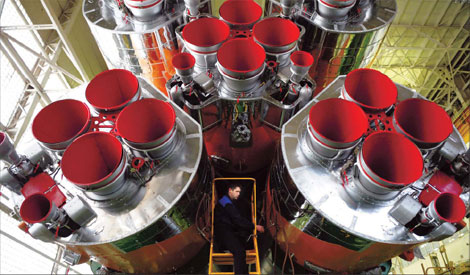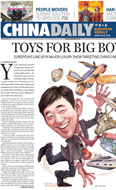Economy
Russia to have key role in building fairer global order
Updated: 2011-04-13 07:54
By Fu Jing (China Daily)
|
The assembly line of Russia's Soyuz TMA-20 manned spaceship at the Baikonur space center in Kazakhstan, in this file photo taken in 2010. In economic development Russia is superior to the other BRICS members. Photos provided to China Daily |
BRUSSELS - Foreign and Chinese experts said Russia is expected to play a leading role in strengthening BRICS, speeding up the development of a more equitable international order.
"As Jim O'Neill coined the term BRIC, there was delight in Russia and now the countries are using the idea to forge tentative links," Fraser Cameron, director of the Russia-Europe Center, told China Daily in an interview.
As a member of United Nations Security Council, the G20, G8 and the Shanghai Cooperation Organization, Russia has been striving to beef up the cohesion of the BRICS and show its leading role in the global community.
In May 2008 Russia hosted the first formal BRIC foreign ministers' meeting and in June 2009 it hosted the first BRIC heads of state summit in Yekaterinburg. A further summit was held in Brazil last year.
But, although Brazil, Russia, India and China discussed how they could have greater influence and seek alternatives to the dollar - they did not reach any tangible agreement.
Lin Yueqin, an economist with the Chinese Academy of Social Sciences, noted that the summit topics basically overlap with those of the G20 summit.
"This indicates that the BRICS are basically concerned about their position in this shifting world without such coordination, these collective interests and positions cannot be expressed with stronger voices."
Currently, the BRICS countries are coordinating their stances on common challenges such as the financial order, climate change, economic growth, trade policy, food security and foreign affairs.
Cameron said Russia suffered badly from the global economic crisis in 2009 with GDP declining nearly 9 percent and a massive flight of capital out of the country. It registered a growth in GDP of 4.5 percent in 2010, but this was insufficient to tackle many pressing social and economic problems.
Russia's challenges include a lop-sided economy heavily dependent on energy and raw materials, a lack of innovation and corruption.
Russia is not an economic power compared with China and India but it remains a political force, according to Lin. "It wants to burnish its image as a global power.
"So Russia wants to use the platform of BRICS to develop more economic and trade relationship to address these domestic challenges," said Lin.
But Cameron also pointed out that Russia is quite different from other BRICS countries though it matched China and India with an annual average economic growth rate of 7 percent between 1999 and 2008.
In economic development, Russia is superior to the other BRICS. Among the BRICS, Russia has by far the highest per capita GDP, $12,000 in 2008, three times that of China. Goldman Sachs forecast that Russia will be the only BRICS country to approach European per capita income levels by 2050.
Russia's higher income level is also evident in superior social indicators. Most impressively, more than two-thirds of Russians of university age are enrolled in university, compared with less than one-fifth of the Chinese.
"So it wants to exert its global influence by better coordinating in BRICS and other international gatherings and this is good for fair and efficient global governance," Lin added.
China Daily
E-paper

Han me downs
Traditional 3,000-year-old clothes are making a comeback.
Reaching out
Fast growth fuels rise in super rich
Chinese tourists spend more
Specials

Big spenders
More mainland tourists are expected to spend money on overseas travel this year.

Rise in super rich
Report cites rising property prices, gdp as key drivers of increasing number of chinese millionaires.

Reaching out
Condom makers are stepping up their presence in smaller cities to boost sales

